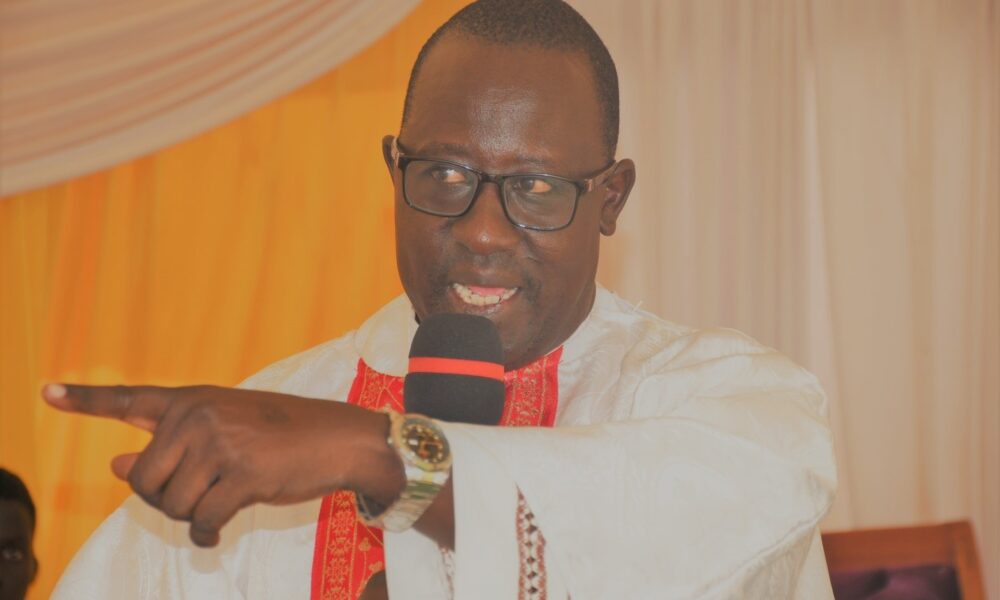By Bida Elly David
A Catholic priest urges the government to take action to end bloodshed and build peace among citizens in the country, instead of ongoing insecurity and inter-communal fights.
Fr. Martin Ochaya Lino, the parish priest of St. Kizito’s parish, made the appeal on Tuesday, while speaking during the second day of youth Eucharistic conference in Juba.
He condemned killings among the youth in the country.
The cleric noted that conflict remains a major concern for young people, humanitarian workers, and religious leaders, among others.
“Humanitarian workers who have been ambushed and killed, and these are innocent people that humans can’t help them. Some priests also felt guilty and were killed. These are people preaching peace and so forth,” he said.
The reverend father described the historical conflict in South Sudan as cultural violence, saying that some believe that their way of life permits murder.
Ochaya further stated that young people historically have not been independent of political influence triggered by cultural lines.
“People died, and we are not going to say one group died. Every South Sudanese died. It started in Juba with the Council of Political Africa. Young people are not independent, because if they were, they would not be part of the conflict among politicians,” he said.
He added that conflict ranges from communities to communities, and people are witnessing bloodshed all over.
Father Ochaya said things shall come to pass if people prioritize forgiveness and reconciliation as values to change mankind from evil.
He urged the authorities to embrace uniting communities at various levels and make them understand the impact of killing on humanity.
“In this country, things can happen, but there has to be a time when things also stop. There has to come a time when there is a new beginning. There has to be a moment when we say enough is enough. We want to be together. We are one people,” he expressed.
Martin echoed that they needed to hear words of forgiveness.
“Forgiveness is the act of excusing a mistake or an offense. Excuse me, mistake, saying sorry for offending, and that is very professional,” he noted.
Furthermore, Martin said forgiveness should be accepted voluntarily, not because of cowardice but to end conflict between antagonistic parties.
“Why voluntary? This is because you don’t want the problem to continue; you allow yourself to suffer alone. That person should not suffer. You are volunteering to be the agents of peace and change without hurting any other person,” he explained.
He underscored that there is a need for South Sudan’s conflicting communities and politicians to accept voluntary forgiveness as a mechanism to end violence and bring about change.
Father underlined that it is hard for some cultures in South Sudan to forgive, particularly when they are mistakenly hurt.
“The biblical teaching on forgiveness and reconciliation is so radical. There are no cultures in our society that can accept forgiveness, yet the Bible says to forgive seven to seven. No culture will accept that,” he noted.
The church leader discouraged the societal tendency to describe a person who forgives as a coward, saying it is an evil act that breaks down societies.
“I heard that sometimes when you forgive easily, people say you are a coward. And some people don’t even want to mention the word malicious forgiveness because of culture. True forgiveness comes at a cost. You must pay something for it,” he underscored.
He said it is the responsibility of the government to ensure that its people live together in harmony without grudges, saying any authority dividing the people is not a good one.
Meanwhile, Rev. Sister Rineta Severino, a nun at St. Paul Major Seminary, applauded Father Ochaya for his teaching, saying it is helpful to young people.
She urged the youth in the church to be ambassadors of change to the divided young people, bringing them to understand Jesus for peace.
Sister Rineta warned young people against using cultural and political influence for revenge or murder, saying they should focus on changing South Sudan.
“Young people, especially youth, should take the culture of killing out of their minds. They should not be deceived by politicians against immoral activities,” she said.
Last week, over 50 people were killed during an inter-communal conflict between Twic and Ngok armed youth in Abyei administrative area.
Despite the conflict, the voice of the church demonstrated pity for young people who involved themselves in attacks rather than living in peace.
Last year, Pope Francis called on political leaders to end conflict across South Sudan and embark on building citizens through peace and love.




